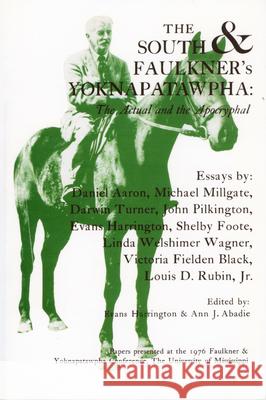The South and Faulkner's Yoknapatawpha: The Actual and the Apocryphal » książka
The South and Faulkner's Yoknapatawpha: The Actual and the Apocryphal
ISBN-13: 9781604733945 / Angielski / Miękka / 1977 / 226 str.
In Michael Millgate's essay he writes that -To see the places where an author lived and walked, and typed; to see what he daily saw, smell what he smelled; experience the resources of his native climate: these things have the fascination of biography, and they can illuminate the work, enrich one's individual apprehension of that work, in much the same way good biography does.-William Faulkner's native climate was the small north Mississippi town of Oxford after which he patterned his mythical Yoknapatawpha County. Each year the University of Mississippi, located in Oxford, sponsors a conference to allow Faulkner enthusiasts to study the author on his own ground. The essays in this volume, delivered as part of the 1976 conference, are concerned with the relationship between William Faulkner's work and its southern setting.As Faulkner himself and the authors of these essays insist, the South is part of the United States and ultimately a part of Western society. Rather than considering Faulkner as an isolated southern oddity who inexplicably wrote important fiction, these authors explore why Faulkner's -Southerness- made him universal.They do not attempt to draw a one-to-one relationship between Mississippi and Yoknapatawpha or to reduce Faulkner to the status of a fictionalizing sociologist recording the life of an area. Daniel Aaron, for example, traces the historical relationship of the South to the rest of the United States and to England, isolates a talent for the concrete and particular as a trait maintained longer in the South than in other regions, and suggests that Faulkner, in embodying his universal insights in a concrete setting and society, was at once most Southern and most universal.











